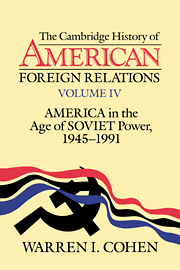Book contents
- Frontmatter
- Prelude
- 1 At war’s end: visions of a new world order
- 2 Origins of the Cold War
- 3 The Korean War and its consequences
- 4 New leaders and new arenas in the Cold War
- 5 Crisis resolution
- 6 America’s longest war
- 7 The rise and fall of Détente
- 8 In God’s country
- Conclusion: America and the world, 1945–1991
- Bibliographic essay
- Index
- THE CAMBRIDGE HISTORY OF AMERICAN FOREIGN RELATIONS
- References
2 - Origins of the Cold War
Published online by Cambridge University Press: 28 March 2008
- Frontmatter
- Prelude
- 1 At war’s end: visions of a new world order
- 2 Origins of the Cold War
- 3 The Korean War and its consequences
- 4 New leaders and new arenas in the Cold War
- 5 Crisis resolution
- 6 America’s longest war
- 7 The rise and fall of Détente
- 8 In God’s country
- Conclusion: America and the world, 1945–1991
- Bibliographic essay
- Index
- THE CAMBRIDGE HISTORY OF AMERICAN FOREIGN RELATIONS
- References
Summary
The end of the killing brought enormous relief to peoples all over the world – and a new set of problems. For the Germans and the Japanese, the years ahead promised to be grim, their well-being, their very survival, dependent on the whims of the victors, including those who not long before had suffered, sometimes terribly, at the hands of German and Japanese troops. For most of the allies, a daunting task of reconstruction awaited. The Soviet Union had lost at least twenty million, perhaps as many as forty million of its citizens before the Nazi onslaught. France, Belgium, the Netherlands, Denmark, Norway, and Great Britain had to rebuild severely damaged industrial infrastructures and recover the means to feed and clothe their people. In China, civil war loomed and the task of regaining even the marginal living standards of the prewar era was gravely threatened. And in the colonial world, millions stood poised to end the age of imperialism, violently if necessary.
By comparison, conditions in the United States were glorious. Relatively few Americans had died in the fighting. Only an occasional shell from a submarine or hostile balloon reached the shores of the continental United States. American industry was intact, prosperous on war contracts. American agriculture was ready to feed the world’s starving masses. Across the country, the call was to “bring the boys home” and return to what an earlier president, Warren Harding, had called “normalcy.”
- Type
- Chapter
- Information
- The Cambridge History of American Foreign Relations , pp. 21 - 57Publisher: Cambridge University PressPrint publication year: 1993



